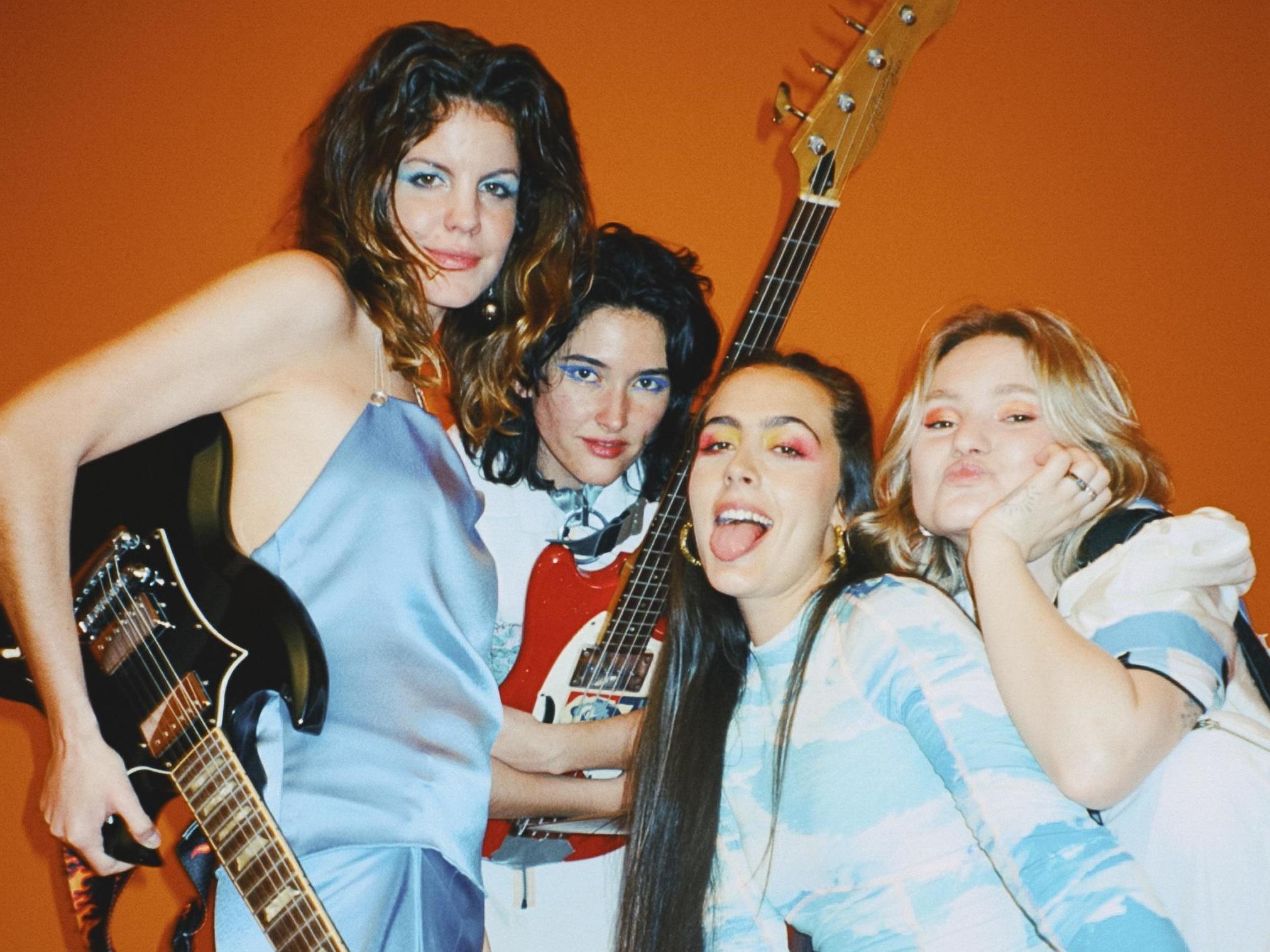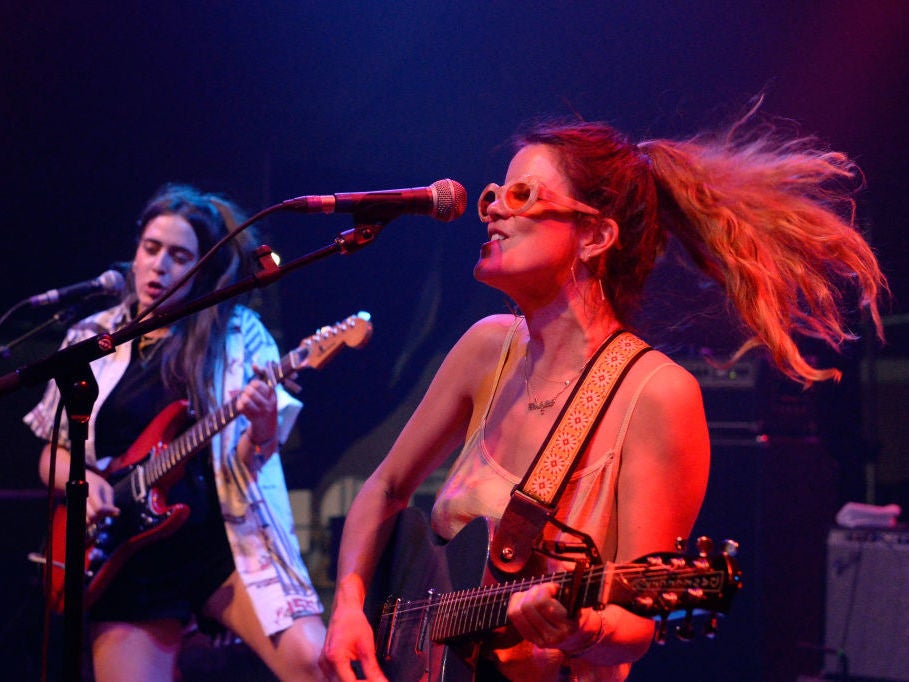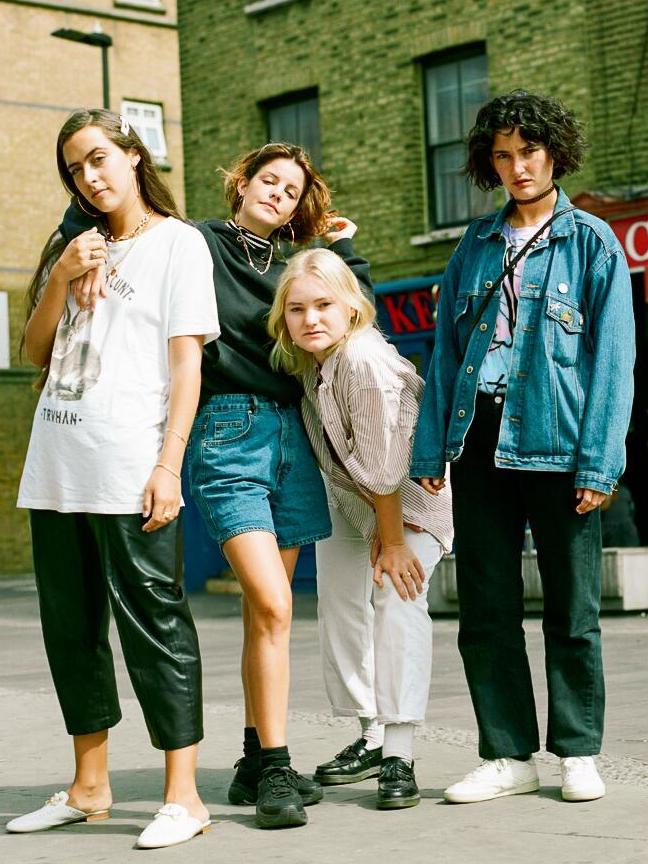Hinds: ‘The generations that don’t see women as equal will die at some point’
Madrid’s indie royalty, Carlotta Cosials and Ana Perrote talk to Mark Beaumont about their dazzling new album, fighting against sexism, and meeting heroes who behaved like ‘dickheads’ towards them

If anything is gonna happen in Madrid, any show, I would not only pay to see that, I’d pay to play!” says Carlotta Cosials, livewire singer and guitarist in Spain’s premiere breakout alt-rockers, Hinds, fizzing in anticipation of a summer of sonic freedom. “Just seeing different faces in reality will be awesome.”
It’s the week before the return of music to venues in Spain. From 11 May, indoor venues in much of the country were permitted to host gigs with a maximum capacity of 30; outdoor events could go ahead, if limited to a seated, socially distanced audience of up to 200. In Madrid, where these new rules came into play a fortnight later, Hinds – gazing out from their video-call windows – are excited, if a little apprehensive at the prospect of music coming down from the balconies, back into the clubs.
Ana Perrote, Carlotta’s co-singer and chilled-out counterfoil, glances offscreen at the outside world gingerly. “The sooner they let us do absolutely anything that is not sitting in the house we’re gonna take the chance and do whatever we can,” she says, but admits to a little anxiety at facing down the “new normal”. “Seven weeks is a lot of time so I already have my routine and my schedule and my wellbeing.” Madrid went into lockdown on 14 March – I wonder if she has become institutionalised by it? “Seriously. It’s not Stockholm Syndrome but it’s a weird cave syndrome. It’s my cave and I’m safe here, I know what I do.”
When Hinds’ spectacular comeback single “Riding Solo” landed last December, a scrappy lo-fi band unexpectedly exploding with colour like an indie rock Wizard of Oz, it was all about missing people back home while on tour. Seven weeks into quarantine, are they now sick of the sight of them and desperate to get back on the road?
“It’s karma!” Carlotta giggles. “We should do the opposite album!”
Ana sighs. “We’ve been so true to ourselves, talking about what we go through, and suddenly what everyone feels is upside down now. What is relatable anymore apart from (sings) ‘I hate being in this house, I want to go and run, I miss my friends and family’?”
Hinds have more reason than most bands to wish the world back into motion; right now it’s their oyster, behind glass. Lockdown caught them mid-transformation, like a makeover show taking a three-month ad break just before the big reveal. You might remember them as the band that emerged from Madrid’s underground indie punk scene in 2014 (then named Deers, until Canadian indie rockers The Dears threatened action) making ramshackle garage pop in the spirit of The Velvet Underground, early Pixies demos or Babyshambles. Perhaps you caught on when they added beef to their gristle for 2016’s second album I Don’t Run, produced by Gordon Raphael of The Strokes’ Is This It fame and it showed. But you’d barely recognise the Hinds of new album The Prettiest Curse, bursting out of their alt-rock cocoon as dazzling psych-pop butterflies drenched in the intergalactic glitters of MGMT, Tame Impala, Perfume Genius and Flaming Lips. And bearing, to these ears, the best indie pop album of 2020 so far.
It poses the flap-jawed question: where did that come from? “We wanted it and we had time,” says Carlotta. “We sat down, we took a breath and we stopped touring. We stopped earning money, that’s why it’s an effort too.”
Hinds’ previous albums were made while watching the clock in expensive studios, stressfully tight on time and budget, in weeks snatched between tours: “we knew we wouldn’t be able to come back to the studio if we f***ed up, so there was a lot of pressure that killed all the fun,” says Ana. This time, determined to experiment beyond their ragged rock sound, they took eight months off to write the new record between Madrid and LA, and recorded it with producer Jennifer De Silva in a variety of studios in London and New York – both professional places and cheap, home-made garage demo set-ups. “The freedom of having fun made all the difference,” Ana argues, and the record certainly bristles with imagination, as well as the confidence of a band who have had to fight hard for respect from the outset, particularly from the press and their rock scene peers in Spain.
“We’d found our identity,” says Ana, “we’d proven ourselves. During our first years we were trying to prove that we could be a rock band, that we could slay and learn solos and Carlotta could play with her guitar behind her back. With the second album we felt the respect back from the industry. In Spain they were listening to us, people weren’t criticising us that much, and that led us to a point where we were free to create something else, not just to prove a point. Playing synths? Why not. Singing in Spanish? Come on, let’s try it ... We’d look at each other and if it was the craziest idea we’d laugh and be like ‘this is f***ing awesome! This is so corny, I love it! Let’s do it!’”
Enjoy unlimited access to 100 million ad-free songs and podcasts with Amazon Music
Sign up now for a 30-day free trial. Terms apply.
ADVERTISEMENT. If you sign up to this service we will earn commission. This revenue helps to fund journalism across The Independent.
Enjoy unlimited access to 100 million ad-free songs and podcasts with Amazon Music
Sign up now for a 30-day free trial. Terms apply.
ADVERTISEMENT. If you sign up to this service we will earn commission. This revenue helps to fund journalism across The Independent.
“We didn’t have a closed path,” Carlotta adds. “During our whole career, we’ve stopped ourselves from some melodies where we’d think ‘o-oh, this is too pop’. With those two albums we wanted to be classified in people’s minds as a rock band, because rock’n’roll is the gender of music that is made of freedom. So it’s gonna allow us to do whatever the f**k we want. So once we’re a rock band, we can do pop songs.”

The Prettiest Curse in question is the “brutal mirror” the album sets out to hold up to society. “We know reality sucks,” Carlotta explains, “everybody knows that more or less, but as musicians and artists our job is to make that reality a little bit sweeter and a little bit prettier if possible. Even though what you’re saying is ugly, because it’s just your reality, we’re trying to find a new sound that makes it a little bit softer, more magical, more filmic. Tragedies can happen in a movie but can still be beautiful.”
For Hinds, that means picking apart and prettying up the struggles and tribulations of the all-girl rock band in 2020. Homesick, lovelorn scorchers like “Riding Solo” and “Boy” echo the loneliness of six years on the road where, according to Carlotta, “it even feels sometimes like the opposite to a life … you’re in constant movement and you cannot stop, and that’s very strange for personal development”, and according to Ana, “there’s 23 hours of miserability and then one hour of the best feeling you could ever feel in your life. That’s why it’s the prettiest curse because we couldn’t feel that way with absolutely anything else. All the rest is bad but it’s worth it because of how incredible it is.”
“The Play” tackles the identity crisis inherent in having one’s individuality stripped away for the greater band good: “all I do is question the multiple reflections of me,” they howl with tangible distress. “The needs [on tour] are Hinds’ needs and not your personal needs,” Carlotta says. “Even your taste – something as simple as ‘we’re gonna have lunch in here and if you don’t like it shut up’. So suddenly when you go back to Madrid the amount of options that life brings you is overwhelming. Suddenly you don’t know what you like any more or you don’t know who you are without Hinds or you don’t know what you can offer to this world without my three girls with me. And what do I offer to Hinds? I have that crisis, I don’t know what’s my character in Hinds, I don’t get it. I see the three of them, the personalities they have, like when you read a book and the four characters complement each other. I see the three of them very clear and I’m ‘I could leave, I’m not offering anything!’ Almost everybody in the band has had a similar crisis sooner or later.”
“What’s really frustrating is not having that freedom of choice in your life,” Ana adds. “Am I gonna miss my cousin’s wedding [because I’m on tour]? Maybe. We are all happy with how this band shaped us – we’ve had to fight a lot, we’ve had to learn a lot, we’ve had to become something amazing really fast, in a really short amount of years, and that was very hard but at the same time very rewarding. But it comes with a lot of sacrifices.”

Most pointed of all is “Just Like Kids (Miau)”, a compendium of real-life comments they’ve suffered from six years’ worth of music’s most condescending sexist arseholes. Choice cuts include “you’re too pink to be admired and too punk to be desired” and “you were successful ’cause your legs are nice”. “Everything we say comes from real conversations or the internet, it’s very common,” says Ana. “This doesn’t happen because of being musicians, it comes with the fact of being girls and not getting that respect. We could be headlining Glastonbury and know for a fact that when we came out on stage someone would be like, ‘you don’t know how to play!’ It doesn’t come because of being successful, it comes from feeling the need to tell a woman what to do, or that they need your advice or your guidance and they’re actually asking for your help.”
Would they put the gender imbalance in rock down to inherent music industry sexism, or are women being put off playing guitar music by this pervasive patronising attitude? “I think it needs time and new role models,” Carlotta argues. “It needs a generation. Some people are in generations that don’t see women and men equally, they will have to die at some point and little by little we’ll build a better civilisation. It’s difficult to click your fingers and have the same amount of girls playing the guitar and writing songs as good as the amount of boys that are playing the guitar and writing songs. It’s kind of impossible because, as kids, you don’t see the same amount of girls doing that. It doesn’t pop up in your mind that you can actually play the guitar, you dream about other stuff that you see girls doing and doing well. Suddenly picking up a guitar is not such a common thing for a girl … yet. Or at least when we were kids.”
“It’s just a reflection of society,” Ana says. “I cannot think of an industry where there’s seriously 50-50, even if it’s equal pay or presence or importance. It’s not on the music industry, it’s a reflection of a bigger picture … it’s how the world in general has treated us.”
As a result of such treatment, Ana has even given up on meeting her heroes. “Every person I was looking forward to meeting, they would be dickheads with us,” she says. “It’s hard to match the expectation you put on your heroes but most of the people we met I always felt like they were looking down on us or looking at us as if we were groupies. I’d see them taking drugs in the bathroom looking super lame or something would happen and I’d be like ‘now all the music I listen to is affected by this thing’ so I’d rather never meet them and enjoy the music and the image I have in my head.”
Ana won’t name the worst culprits, but will acknowledge the big exception: those gentlemen of New York indie rock, The Strokes. “Our best friends!” Carlotta squeals when we bring up their short tour supporting the NYC legends at small shows in London and Paris earlier this year. “Imagine my head when I knew we were going to meet The Strokes,” Ana grins. “I was like ‘Ana, expect less than nothing, if they spit on you, be thankful!’ I was so ready, because on top of everything they already have a thing of maybe not being the nicest people around. And suddenly the biggest, supposedly nastiest band ever were the most humble, nicest, sweetest guys. They were unbelievable, genuinely interested in us and in us having fun and feeling comfortable. They drove our instruments from one city to another in their massive truck so we didn’t have to carry them. Something like that changes the experience of a band and they would go out of their way, every one of them and their team, to make us feel better.”
The Strokes might be the gentlemanly face of guitar music’s historic male dominance, but The Prettiest Curse is the latest superb example of its days being numbered. “We can share it, y’know?” Carlotta says, with the smirk of a frontline pioneer. “It doesn’t mean that we’re gonna kick your asses and put you in the ground. We can share the world.” And once lockdown lifts, that’s a new normal we can all embrace.
‘The Prettiest Curse’ is out on Friday 5 June
Join our commenting forum
Join thought-provoking conversations, follow other Independent readers and see their replies
Comments
Bookmark popover
Removed from bookmarks